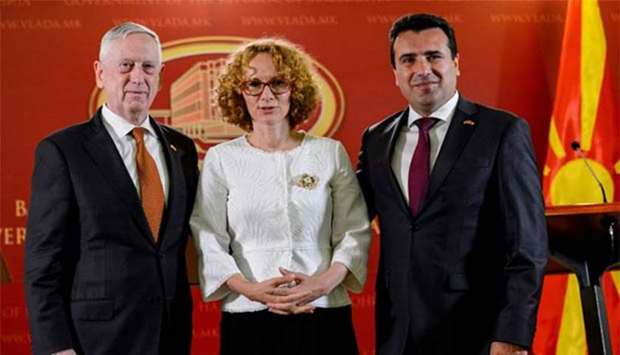* Referendum set for September 30 on name change
* New name would be Republic of North Macedonia* Change would clear way to Nato, EU membership
* Russia seen trying to thwart the deal
US Defense Secretary Jim Mattis accused Russia on Monday of attempting to influence the outcome of a referendum in Macedonia on changing the country's name that would open the way for it to join Nato and the European Union.
Speaking after talks in Skopje with Macedonia's leaders, Mattis also said the United States was looking to expand cybersecurity cooperation with the small Balkan country.
Macedonians will vote on September 30 on a deal reached in June with neighbouring Greece that would change the country's name to the Republic of Northern Macedonia. Athens insisted on the change in return for lifting its opposition to Skopje joining Nato and the EU.
"We do not want to see Russia doing there (in Macedonia) what they have tried to do in so many other countries," Mattis told reporters travelling with him to Skopje, apparently referring to Washington's concerns about Russian meddling in the 2016 US presidential election and other polls.
"No doubt that they have transferred money and they are also conducting broader influence campaigns," Mattis said, adding it was unclear how effective Moscow's efforts had been.
Russia denies the charges of meddling but strongly opposes Macedonia's plan to join Nato. Its ambassador in Skopje has said the country could become "a legitimate target" if relations between Russia and Nato deteriorate further.
In July, Greece expelled two Russian diplomats and barred two other people from entering the country for trying to bribe officials and foment demonstrations to thwart the deal with Macedonia.
Russia denied Athens's allegations and responded in kind by expelling Greek diplomats.
'Malicious cyber activity'
Mattis is the latest in a string of Western leaders, including German Chancellor Angela Merkel, to visit Macedonia and urge its citizens to back the name deal.
"... we plan to expand our cybersecurity cooperation to thwart malicious cyber activity that threatens both our democracies," Mattis said, with Macedonia's prime minister and defence minister standing next to him.
Mattis also met Macedonia's President Gjorge Ivanov, who opposes the name deal.
Nato has invited Macedonia to begin accession talks with the alliance, but says it must first change its constitution and adopt the new name. The EU has also said it would set a date for Macedonian accession talks pending implementation of the deal.
Recent opinion polls suggest a majority of Macedonians will support the name deal, though nationalists oppose it. Several thousand Macedonians rallied on Sunday in Skopje in support of the deal and of Nato and EU membership.
"There is no alternative for the Republic of Macedonia then integration into Nato and EU," Prime Minister Zoran Zaev said on Monday, standing beside Mattis.
Washington is concerned that Russia is sowing disinformation with the aim of suppressing voter turnout in the referendum and creating an impression that the United States is not committed to the region.
"Our approach to disinformation is not to try to counter every single argument... We show by our senior-level visits, our presence, we show by highlighting our cooperative activities," Laura Cooper, deputy assistant secretary of defense for Russia, Ukraine and Eurasia, told reporters before the Mattis trip.
The United States spends nearly $5mn a year in security assistance for Macedonia and since 1991 has provided about $750mn in total assistance. Macedonia has a few dozen troops in Afghanistan as part of the Nato-led mission.

